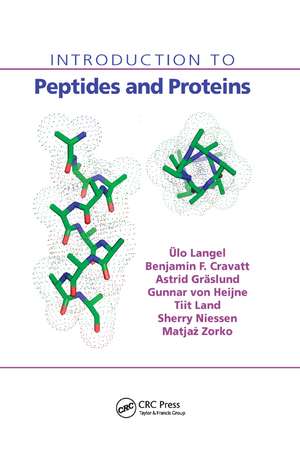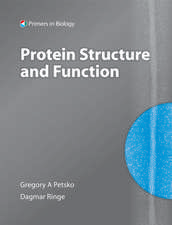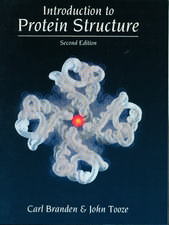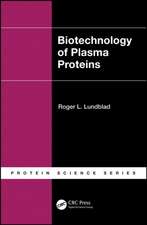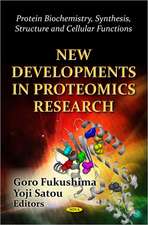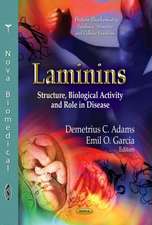Introduction to Peptides and Proteins
Autor Ulo Langel, Benjamin F. Cravatt, Astrid Graslund, N.G.H. von Heijne, Matjaz Zorko, Tiit Land, Sherry Niessenen Limba Engleză Paperback – 19 sep 2019
Introduction to Peptides and Proteins brings together some of the most respected researchers in protein science to present a remarkably coherent introduction to modern peptide and protein chemistry. The first sections of the book delve into –
- Basic peptide and protein science from assembly through degradation
- Traditional and emerging research methods including those used in bioinformatics and proteomics
- New computational approaches and algorithms used to find patterns in the vast data collected by sequencing projects
After providing a foundation in tools and methods, the authors closely examine six protein families, including representative classes such as enzymes, cell-surface receptors, antibodies, fibrous proteins, and bioactive peptide classes. They concentrate on biochemical mechanisms and where possible indicate therapeutic or biotechnical possibilities.
Then focusing on clinical aspects, the authors investigate misfolding as found in prion diseases, miscleavage as found in Alzheimer’s, and mis-sequencing as found with some cancers. Drawing from some of their own research, the authors summarize recent achievements and emerging applications. They discuss the use of proteins and peptides as drugs and the solid-phase synthesis required for drug production. They also look at the use of peptides as functional biomolecules and research tools.
No longer just th
| Toate formatele și edițiile | Preț | Express |
|---|---|---|
| Paperback (1) | 489.26 lei 6-8 săpt. | |
| CRC Press – 19 sep 2019 | 489.26 lei 6-8 săpt. | |
| Hardback (1) | 1282.82 lei 6-8 săpt. | |
| CRC Press – 18 noi 2009 | 1282.82 lei 6-8 săpt. |
Preț: 489.26 lei
Preț vechi: 575.60 lei
-15% Nou
Puncte Express: 734
Preț estimativ în valută:
93.65€ • 101.76$ • 78.72£
93.65€ • 101.76$ • 78.72£
Carte tipărită la comandă
Livrare economică 21 aprilie-05 mai
Preluare comenzi: 021 569.72.76
Specificații
ISBN-13: 9780367384876
ISBN-10: 0367384876
Pagini: 420
Dimensiuni: 156 x 234 x 25 mm
Greutate: 0.45 kg
Ediția:1
Editura: CRC Press
Colecția CRC Press
ISBN-10: 0367384876
Pagini: 420
Dimensiuni: 156 x 234 x 25 mm
Greutate: 0.45 kg
Ediția:1
Editura: CRC Press
Colecția CRC Press
Public țintă
Professional ReferenceCuprins
Introduction. Amino Acids. Noncovalent Interactions. Structural Organization of Proteins. The Biosynthesis of Proteins. Posttranslational Modifications. Protein Folding. Intracellular Sorting of Proteins. Protein Turnover. Purification and Characterization of Proteins. Crystallography and X-Ray Diffraction. Optical Spectroscopy. Nuclear Magnetic Resonance (NMR). Methods to Follow Protein Folding. Mass Spectrometry. Chemical Synthesis of Peptides and Proteins. Protein Engineering and Gene Silencing. Protein–Ligand Interactions. Sequence Analysis and Function Prediction. Protein Structure Prediction. Proteomics. Enzymes. Nucleic Acid–Binding Proteins. Cell Surface Receptors and Signaling. Membrane Proteins. Antibodies. Fibrous Proteins. Selected Classes of Bioactive Peptides. Misfolding-Based Diseases. Miscleavage-Based Diseases. Missequence-Based Diseases. Peptides and Proteins as Drugs.
Notă biografică
Langel, Ulo; Cravatt, Benjamin F.; Graslund, Astrid; von Heijne, N.G.H. ; Zorko, Matjaz; Land, Tiit; Niessen, Sherry
Descriere
Authored by key players in the field, this volume offers a relevant presentation of peptide and protein chemistry. It provides key insight into the fast-developing field of proteomics, including structural and functional aspects, biochip development, and clinical potential. It includes chapters on bioinformatics and proteomics and presents the latest information on concerns over protein degradation and the post-translational modifications of proteins and peptides. The book also includes a section on protein-coupled diseases that presents increasing evidence of the pathological impact of protein misfolding in relation to various neurodegenerative diseases, as well as a section on the role of proteins in cancer.
